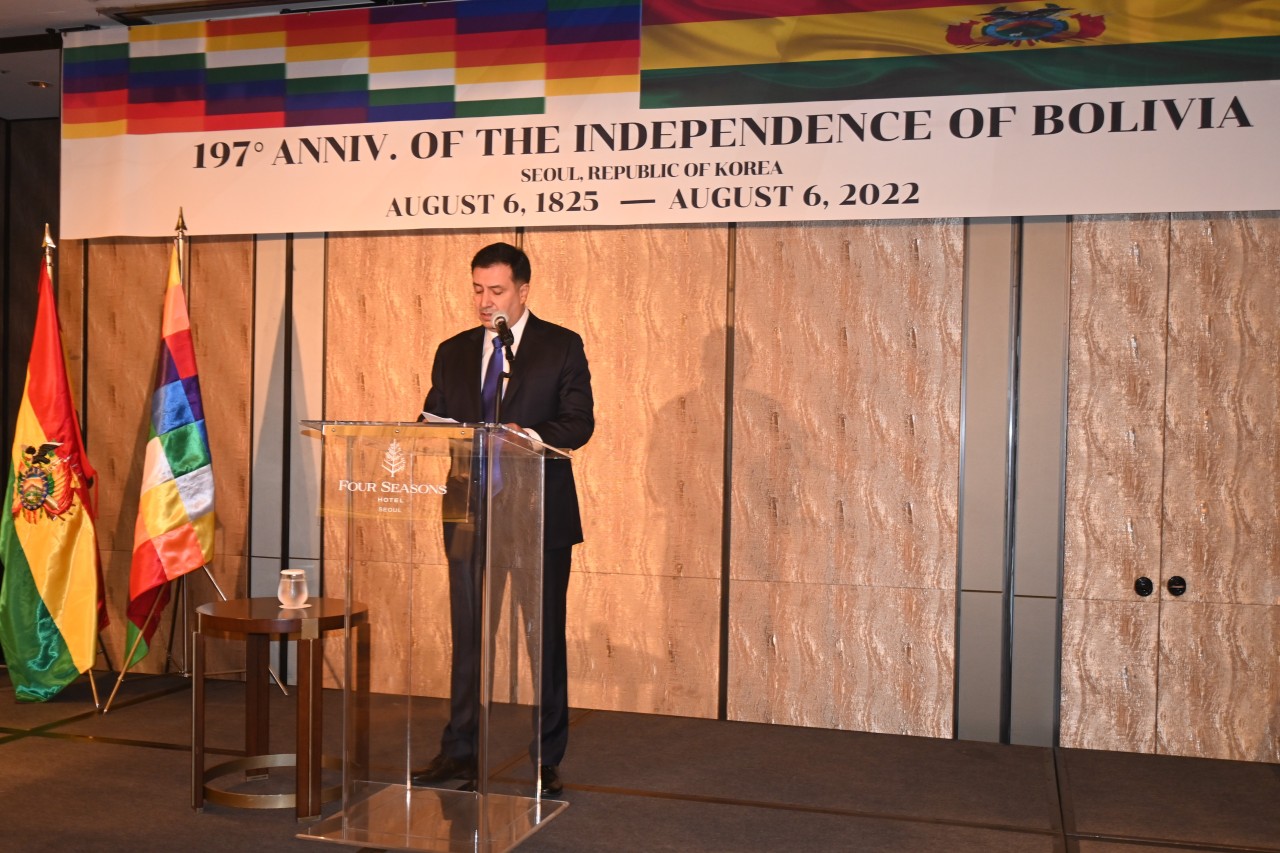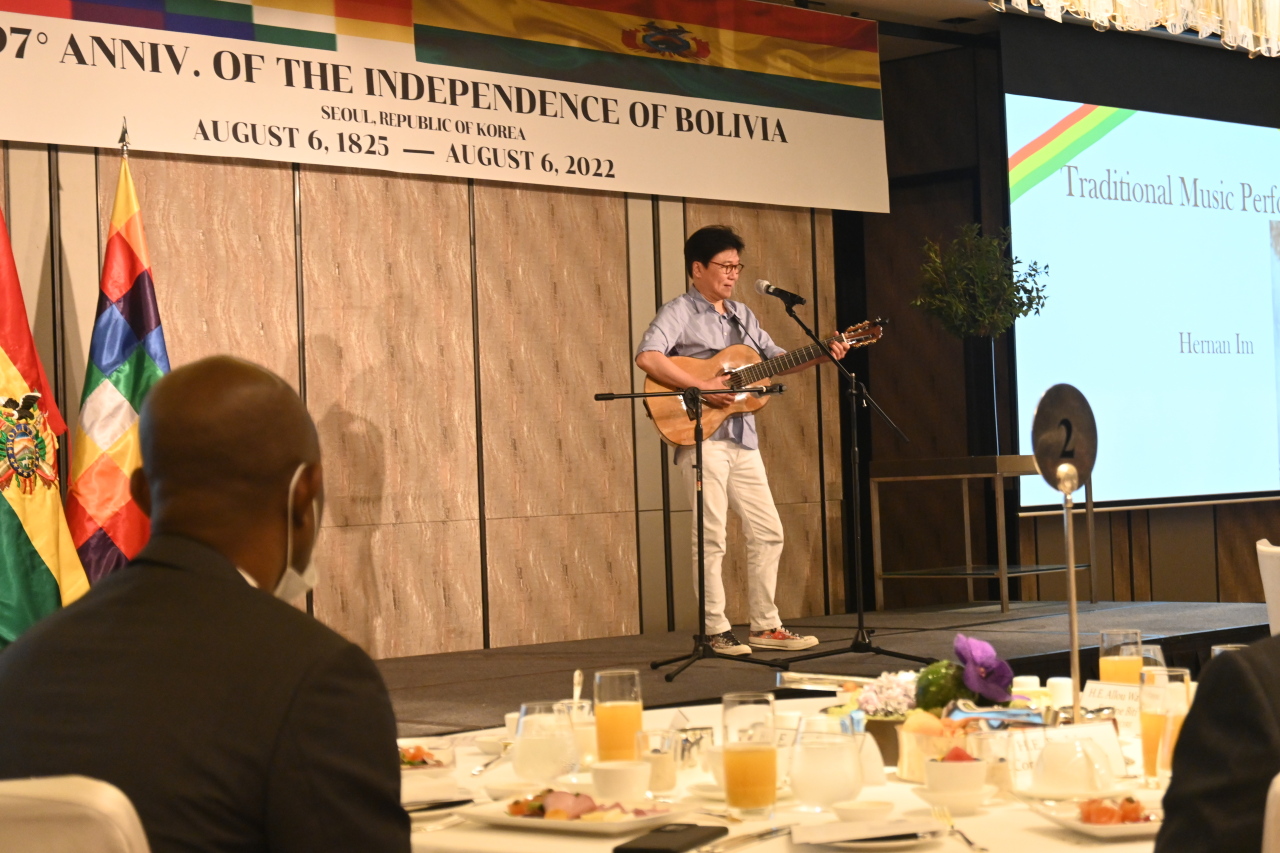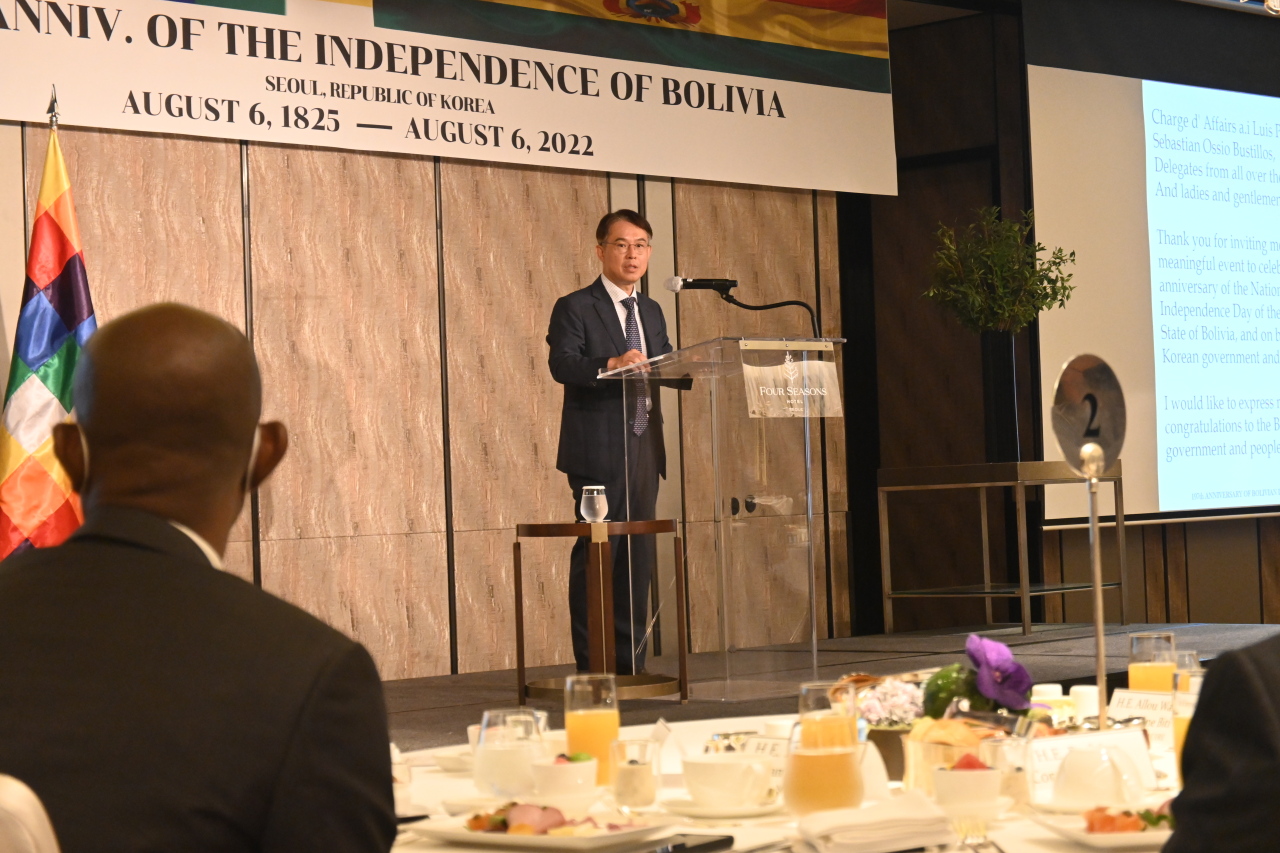
Bolivian charge d’affaires to South Korea Luis Pablo Sebastian Ossio-Bustillos welcomes guests and delivers opening remarks for Bolivia’s 197th Independence Day at the Four Seasons Hotel in Seoul on Aug. 5. (Sanjay Kumar/The Korea Herald)
Bolivia recalled martyrs’ sacrifices, introduced the country’s potential and highlighted economic cooperation with South Korea at a celebration of its 197th Independence Day in Seoul Friday.
Bolivian Independence Day commemorates the signing of a declaration of independence from Spain on Aug. 6, 1825.
Bolivia was a Spanish colony from 1532-1825.
Assessing Bolivia-Korea relations in his remarks, Bolivian Charge d’affaires to South Korea Luis Pablo Sebastian Ossio-Bustillos touched upon the decadeslong growth of economic relations that made Bolivia achieve an accumulated trade balance of more than $2.5 billion from exports of zinc, lead and silver minerals, as well as non-traditional products such as Brazilian nuts, alcohol and coffee.
According to Ossio-Bustillos, such items have allowed Bolivia to record exports of $301 million to Korea in the first half of the year, while imports from Korea came to $34 million.
Bolivia is also working with South Korean entities to expand the country’s industrial capacity, through projects such as a Samsung Engineering-led $900 million project to build an ammonia and urea fertilizer plant in Cochabamba.
“The plant would produce 600,000 tons of urea in 2022, managing 85 percent of capacity with directed export for Brazilian and Peruvian markets,” the envoy said, adding that Bolivia expects to raise a record figure of $350 million by the end of 2022.
Ossio-Bustillos applauded the financial cooperation of the Economic Development Cooperation Fund of Korea’s Eximbank to build the longest bridge in Bolivia, the Puente Banegas.
The EDCF, launched in 1987, helps less developed countries by providing low-interest, long-term loans.
Korea prioritized Bolivia in the Latin American region to provide valuable development cooperation, Ossio-Bustillos said, citing the Korea International Cooperation Agency as an important partner.

An artist performs a Bolivian song and dance during the reception of Bolivia’s 197th Independence Day at the Four Seasons Hotel in Seoul on Aug. 5. (Sanjay Kumar/The Korea Herald)
Ossio-Bustillos said that Korean cooperation supports Bolivia‘s industrialization process with food security and sovereignty. It also supports provisions for installing solar panels, executing irrigation and well drilling programs to guarantee drinking water for entire population.
The Korea International Agriculture Program enabled improvement in poppy, quinoa, tomato, rice and maize seeds, according to Ossio-Bustillos.
“Korea reopened its embassy in La Paz in 2008 and Bolivia did so in 2014,” said Ossio-Bustillos, congratulating Bolivia and Korea for reducing poverty, eradicating illiteracy and attaining political and social stability.
Highlighting his country’s potential, Ossio-Bustillos said Bolivia was the least volatile among neighboring countries amid current international context with sceneries of uncertainties and several multifaceted crises.
Bolivia bases growth on domestic demand, which offers stability to the Bolivian economy without social costs due to government subsidies for sensitive prices of bread and gasoline, according to Ossio-Bustillos.
“Bread and gasoline products in Bolivia would probably be the cheapest in the world,” he said.
Bolivia, located in the heart of South America, prioritizes interconnectivity of its vast territory, as well as improving infrastructure of roads, bridges, railways, hydroelectric power plants and airports, said Ossio-Bustillos.
According to Ossio-Bustillos, Bolivia, a founding member of the Andean Community of Nations with Peru, Ecuador and Colombia, is to join the South American trade bloc Mercosur, or Southern Common Market. Mercosur member states include Argentina, Brazil, Paraguay and Uruguay.
Ossio-Bustillos highlighted Bolivia’s trade balance, solid currency, low inflation of around 1 percent and falling unemployment rate as bright aspects of the country.

Choi Jung-uk, general director for Latin American and Caribbean affairs at the South Korean Ministry of Foreign Affairs, delivers remarks for Bolivia’s 197th Independence Day at the Four Seasons Hotel in Seoul on Aug. 5. (Sanjay Kumar/The Korea Herald)
Meanwhile, Choi Jung-uk, the general director for Latin American and Caribbean affairs in the Ministry of Foreign Affairs, also delivered remarks, highlighting Bolivia’s significance to Korea.
Choi underlined Bolivia as one the four major Latin American partners of development cooperation for sustainable development.
“Korea is trying to take a step closer to Bolivia through Korean culture such as K-pop and K-drama, in which Bolivians are interested,” he said.
Choi added that he hoped human and cultural exchanges between Korea and Bolivia, which were suspended due to COVID-19, would resume soon.








